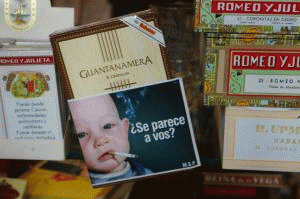Reprinted from www.corpwatch.org
Philip Morris filed the original complaint on February 19, 2010, claiming that Uruguay's laws were a violation of a 1991 bilateral investment treaty between Uruguay and Switzerland. The company says that legal requirements that graphic warnings about the health hazards of smoking must cover most of the surface area of cigarette packets have harmed the company's trademarks and profits.
"The large size of these warnings prevents us from effectively displaying our trademarks and goes beyond what could reasonably be considered appropriate to inform consumers of the well-established health risks of smoking," Morgan Rees, a spokesperson for Philip Morris, told Investment Arbirtation Reporter. "This is without precedent anywhere in the world."
"We will fight because it is our right and duty as a government to protect our citizens' health," Silvina Echarte Acevedo, the legal adviser leading the Uruguayan ministry of public health's case, told the Independent newspaper. "They are bullying us because we are small. This is like David and Goliath." (Uruguay's annual gross domestic product is $53 billion, less than that of Philip Morris which took in $80 billion last year)
Governments around the world are watching the outcome as they begin to consider similar tobacco packaging laws to curb the $756 billion global industry. "They wanted to make an example of Uruguay," says Matt Myers, the executive.director of Tobacco Free Kids, a U.S. NGO. "It was a message designed to be global."
There is no doubt that Uruguay's strict tobacco packaging laws, which were first introduced in 2005, have had already had a major impact on local cigarette sales. After companies were required to print photos of premature babies, decaying teeth, and hospital operations on cigarette packages, smoking rates dropped from 33 percent to 12 percent among Uruguayan teenagers and from 40 percent to 23 percent among adults.
Since the 2010 complaint to the ICSID, Philip Morris has expanded its war on national tobacco packaging regulations. In 2011, the company sued Australia in local courts over the Tobacco Plain Packaging Act, but lost. The company has now appealed the decision to the United Nations Commission on International Trade Law, claiming that 2011 law violates a 1993 bilateral treaty between Australia and Hong Kong.
Philip Morris has been more successful with a 2013 lawsuit in Thailand where courts have ordered the temporary suspension of a new tobacco packaging law. It is not alone in this fight - Japan Tobacco, another major tobacco giant, has also sued Thailand click here
(Note: You can view every article as one long page if you sign up as an Advocate Member, or higher).





